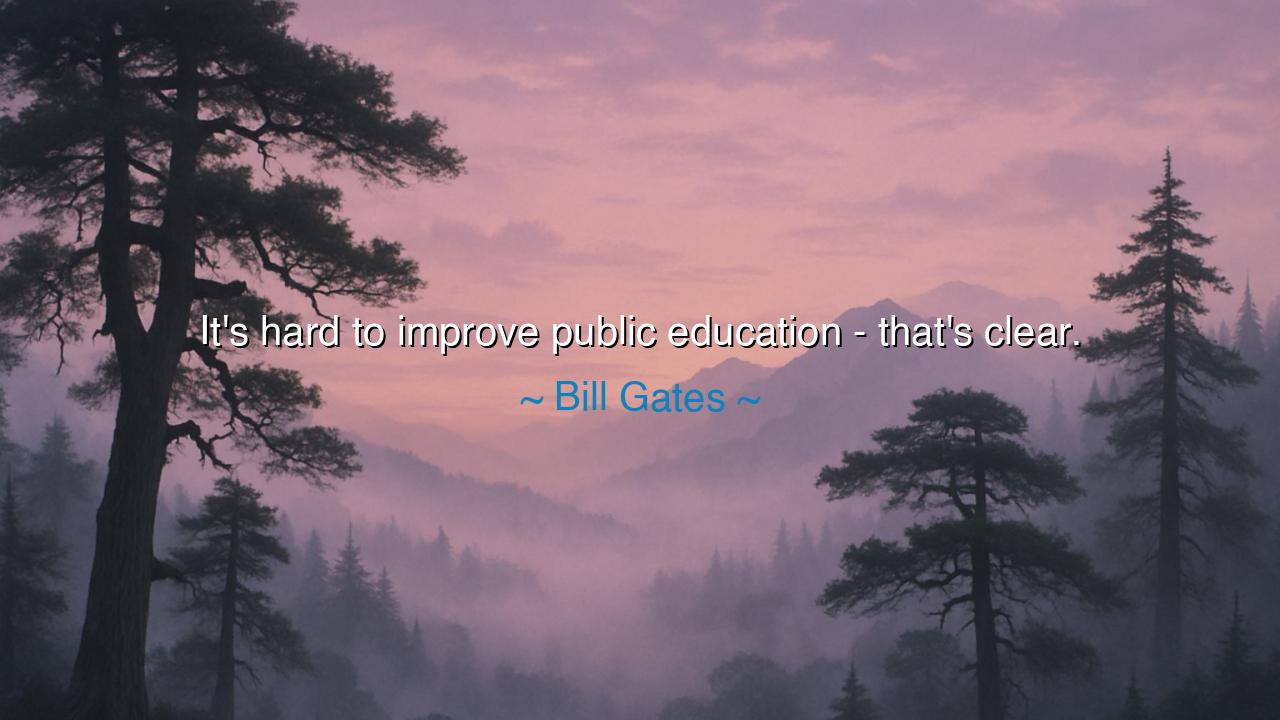
It's hard to improve public education - that's clear.






Hear the sober words of Bill Gates, who declared: “It’s hard to improve public education—that’s clear.” Though plain in sound, these words carry the weight of centuries, for they speak of one of humanity’s greatest struggles: how to teach its children well. Gates, a man who built vast empires of technology, recognized that the transformation of schools is a task far more complex than engineering machines or growing fortunes. For in public education, we are not dealing with circuits and codes, but with hearts, minds, and the destinies of nations.
The difficulty arises because public education touches every soul. It is the great equalizer, the common ground where rich and poor, strong and weak, stand side by side. To change such a system is to touch society itself. Teachers, parents, governments, and communities all hold a stake in its design. Thus, even the smallest reform must pass through countless voices, each demanding to be heard. What seems simple in theory—better funding, stronger teachers, wiser curricula—becomes tangled in the reality of human division. This is why Gates, with all his power, could only confess: the task is hard, and that is clear.
History proves his words. Consider Horace Mann, who in the 19th century sought to establish free public schools in America. He faced fierce opposition from those who saw no reason to educate the poor, from religious leaders who fought for control of instruction, and from taxpayers unwilling to bear the burden. Yet Mann pressed on, and though progress was slow, his vision gave rise to the system we know today. His struggle shows that improving public education has always demanded not just wisdom but endurance, not just ideas but sacrifice.
Even in our own time, nations continue to wrestle with this truth. Finland, now praised for its schools, did not reach its success overnight. For decades, it struggled with inequity and mediocrity. Only through persistent reforms—emphasizing teacher training, equality, and trust—did it rise to become an example to the world. Gates’ words echo here: the difficulty was immense, but the reward profound. The lesson is that though the path is hard, it is not hopeless.
We must also understand the heart of the challenge. To improve public education is to ask not only, “What should children know?” but also, “What kind of people should they become?” This is no small question. Should we train workers, or cultivate thinkers? Should we prepare citizens, or nurture dreamers? Every society answers differently, and thus every reform is burdened by competing visions of the future. Here again, the words of Gates remind us: clarity of purpose is rare, and without it, change falters.
The lesson for us is plain: do not despair at the difficulty, but recognize it as the nature of the task. If public education could be improved easily, it would have been perfected long ago. Instead, it demands patience, collaboration, and a willingness to learn from both failure and success. It demands that we set aside pride and ideology and ask, “What truly serves the child?” For the child is the seed of the future, and to neglect the seed is to wither the harvest.
Practical action follows: support teachers, for they are the warriors on the front lines. Value schools not as burdens on the treasury but as investments in destiny. Learn from other nations, but shape reforms to the needs of your own people. Above all, honor the sacred truth that every child, regardless of station, deserves the light of knowledge. For though the task is hard, it is holy, and its fruits endure longer than empires.
So let Bill Gates’ words echo in our minds: “It’s hard to improve public education—that’s clear.” Yes, it is hard, as all noble things are. But difficulty is not defeat. Let us meet the challenge with courage, and though the way be long, we may yet build schools where every child is lifted, every talent is nurtured, and every generation rises higher than the one before.






AAdministratorAdministrator
Welcome, honored guests. Please leave a comment, we will respond soon